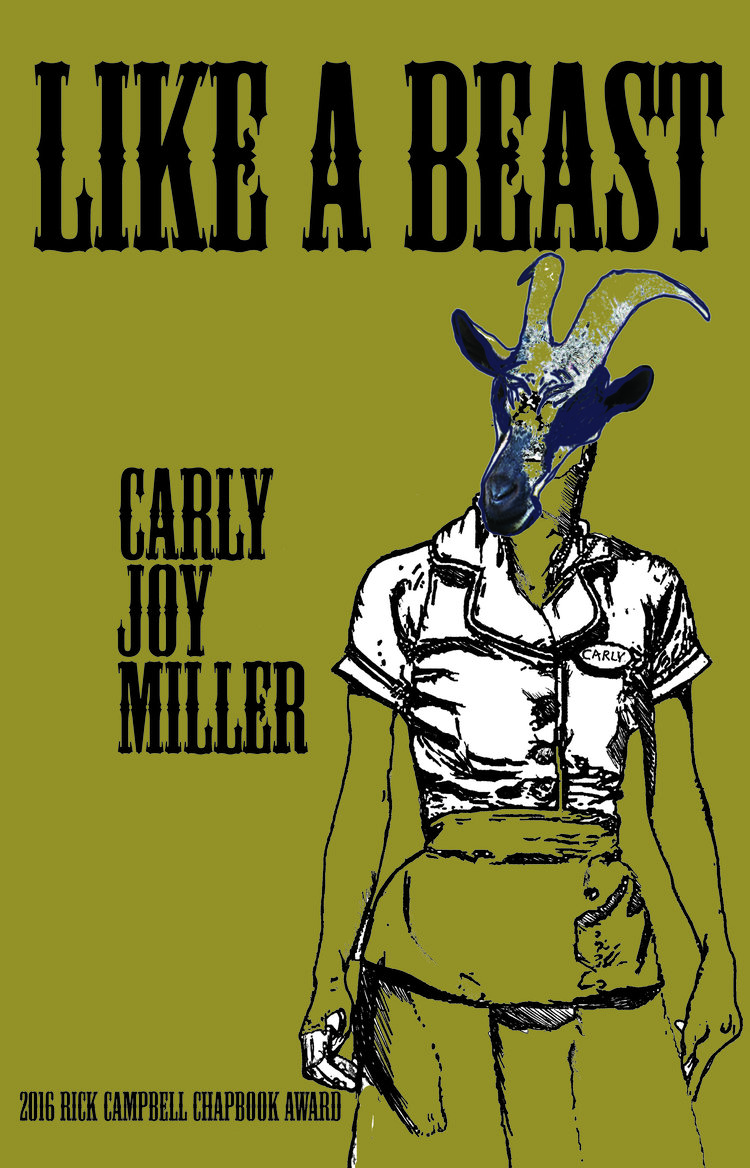Review: LIKE A BEAST by Carly Joy Miller

Like a Beast
Carly Joy Miller
Winner of the 2016 Rick Campbell Chapbook Award
28 pages
Review by M.K. FOSTER
Though it ‘be but little, it is fierce’— Carly Joy Miller’s debut, prize-winning chapbook makes no bones about the bloody love-hate relationship between grief and memory in the body, and the lyric outcome is ‘red in tooth and claw.’ Bestiary-inspired, Like a Beast rips through mannered narrative and guts postured syntax and grammatical law; Like a Beast bites down to a visceral, emotional core that lies beneath the civilized logic that envelopes even the would-be ‘wildest’ poems. Like a Beast begs you follow it, then hunts you back.
Structured in the organic trajectory of nighttime and daylight, Like a Beast draws the reader through Nightshifts, into Midshifts, and out through Dayshifts, threading itself through its center with a ‘Threnody,’ or lamentation, and a ‘Ceremonial,’ or ritual song. Thus ordered, Like a Beast is both she-werewolfian odyssey, a beast-body’s vigil through night to reach morning— and a night-owl shift-schedule, as one might have in a diner, short-order café, or other domestic venue, an ordinary public space where even the most extraordinary monster can hide in plain sight. And yet, the evolution of figures across the landscape of the book is no exception in rigor or pace to the episodic metamorphosis: galloping through the Nightshifts from ‘Waitress’ to ‘Horsebride,’ ‘Slaughter’ to ‘Doppelgänger,’ before becoming a sequence of contemplations in the Midshifts, and emerging in the Dayshifts as ‘Pariah,’ then ‘Conduit,’ ‘Spoon in the Lover’s Mouth,’ and ‘ ‘Yours.’ Structure and figuration combined, the effect, then, is sublime and electric, equal parts Hopper’s Nighthawks and Goya’s Saturn.
Guided by a honey-dipped voice, we the “sweet thing[s],” the “onlooker”-readers, accompany a nameless, faceless “frankenstein…animal”-narrator farther and farther into the wooded imagination of a dark, hostile memory world in pursuit of freedom from loss, betrayal, and sacrifice. A savage female intelligence points the way, and her brutal tenderness carries us. “Hallelujah I’m purposed” and “Amen for fright,/ the gaudy shriek,” the beast-narrator sings in “Nightshift as Slaughter,” while across the page in “Nightshift: Waiting for the Search Party,” her ache goes deeper. “My voice a brute/ lost to weedful dark, Lord:/ discovering I am without my legs,” she speaks in pain as much in prayer, all the while flooding the planes of our minds with the horror that rushes through hers. A scythe as it opens a chest filled with dead creatures, rotted fruit strewn across a barren landscape, bones crocheted as elegantly as lace, as we learn in “Nightshift as Doppelgänger,” every measure of fur and fang—“Terrible sounds// of gobbledom/” as it were, a line which takes its place at the chapbook’s center.
As the heart of the chapbook’s structure and theme, “Ceremonial: Heart of the Trottered Beast” throbs with grief and guilt of both the speaker’s body and her desire for release. “I never/ considered the cathedral// a body needing to break,” she reveals in this line, exposing and empathizing with the most pained parts of her revelations about redemption: that holiness is lonely, that sacred bodies require violence, and that forgiveness is a bloodied thing. “Slice the gut. Dig// the ticking thing out:/ Sacrament. Blood lyre.// I wipe my tongue of it,” the beast-narrator goes on to confess, as much as viciously reminisce— an intimately gristly tension and power dynamic that plays out throughout the chapbook, always insisting in its own slick way, if you’re not the hand heaving the meat cleaver here, you’re the neck on the chopping block.
And yet, leaving the dark, “My head/” she sings in “Dayshift as Conduit,” “is a grief// prison.” “Day/ airs me// like a sin left to mercy,” she remarks, stepping into the light in “Dayshift Caught in the Ribs,” almost watching her body morph from beast back to woman back to being “Yours ‘Entire.” “Bellow me back—” from this journey through so many the bodies of animals, the narrator prays in “Dayshift as Yours,” “I am in your hands you know,” she whispers, placing herself belly up— long enough to be tamed or long enough to get close, near enough to take a clear, thick bite out of the reader’s throat.